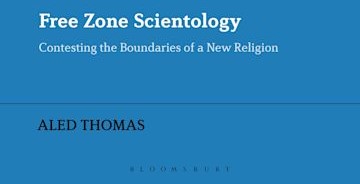Free Zone Scientology as a New Religion: Q&A with Aled Thomas

In this post, we feature the book, Free Zone Scientology: Contesting the Boundaries of a New Religion (Bloomsbury, 2021). The author, Dr Aled Thomas, is a teaching fellow in Religious Studies at the University of Leeds and a member of the Centre for Religion and Public Life. We asked him a couple of questions about his book.
How has this book come about?
This book is the culmination of my doctoral research, completed at the Open University in 2019. It is a study of Free Zone Scientology – Scientology outside the institutional Church of Scientology – and aims to move the study of ‘new religions’ (broadly conceived) away from the typologies which have dominated the field thus far. My interest in contemporary/minority religions stems back to my undergraduate days, but Free Zone Scientology captured my attention due to its contested nature – particularly questions of authority, innovation, and religious ‘legitimacy’. Despite its focus on a minority religion, the book holds a significance for the wider study of religions; acting as a case study of the ways in which religions attempt to control or subvert knowledge in the digital age.
What is the key argument that the book develops?
The book centres on the Scientologist practice of ‘auditing’ through the method of lived religion. Auditing is a spiritual practice comparable to counselling, in which Scientologists (guided by a trained ‘auditor’) will recall previous life experiences (particularly traumatic ones) to remove the presence of ‘engrams’ (traces of anxieties/neuroses) from their mind. Within the Church of Scientology itself, auditing has maintained a sense of orthodoxy; it is practised in the way the Church believes L. Ron Hubbard (the founder) intended. However, I argue in this book that creative and innovative approaches to auditing has led to the emergence of ‘Scientologies’ – different ways of understanding, practising, and belonging within Scientology. This leads to contested discourses amongst Scientologists concerning the nature of the Self, authenticity/innovation, and the use of material objects. Accordingly, the relationship between Scientologies are marked by competing claims of authenticity and attempts to control knowledge/praxis.
What insight does the book provide into the relationship between religion and public life?
The book offers a two-fold approach to the relationship between religion and public life. Firstly, it addresses a movement that is often sensationalised in public discourse; discussed in relation to controversy on the one hand, and celebrity practitioners on the other. It avoids top-down projections of institutional religion, instead using a lived religion approach to ask how religion can be understood from vertical-horizontal perspectives. By adopting this method, the book aims to understand contemporary Scientologist practices from the perspectives of Scientologists in a variety of deregulated/loose environments – moving away from tabloid sensationalism and towards crucial issues in the everyday life of a Free Zone Scientologist.
Secondly, the book offers a window through which we can view new and emergent forms of digital religion. Everyday religion is taking an increasing turn towards digital approaches – both in terms of ‘old’ practices transitioning into online spaces, but also new and creative ways of ‘doing religion’ in unregulated digital environments. The book addresses this creativity, using Free Zone Scientology as a case study of how the Internet can be used as a space for developing new religious ideas.
Give us one quote from the book that you believe will make us go and read it?
“Maintaining a double-focus on this vertical-horizontal axis has opened the study of Scientology to new questions and a new emphasis on lived Scientologies outside the CoS [Church of Scientology], complicating questions of power and authority and re-framing them in terms of authenticity, innovation and materiality. These new frames are portable and can be applied beyond the CoS and the Free Zone. They possess broader societal implications in relation to understanding how institutions try to control and protect knowledge and methods, and the ways in which people attempt to sidestep and subvert this.” (p. 167)
